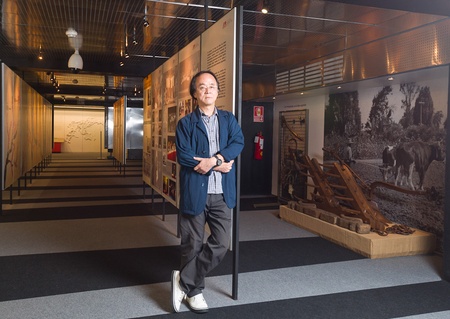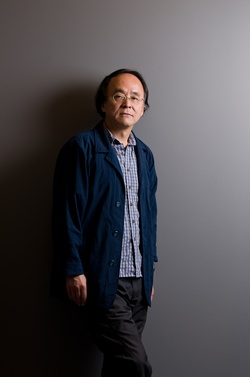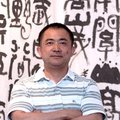¿Qué significa sentirse japonés? Hacerse esta pregunta a los 16 años no fue solo cuestión de curiosidad juvenil. Fue el punto de partida de una larga investigación emprendida por el historiador Toshio Yanagida, cuya búsqueda de respuestas lo trajo por primera vez a nuestro país hace más de 20 años.
Ha regresado otras 30 veces más en estas dos décadas, en las que ha podido acercarse a la historia de la inmigración japonesa al Perú. A la par, es un estudioso de la presencia de los migrantes latinoamericanos en Japón.
¿Cuándo se interesó por investigar a la comunidad nikkei peruana?
En 1989, pero antes de eso yo quería analizar la formación de ser japonés. Me decía a mí mismo “yo me siento japonés”, pero ¿por qué yo me siento japonés? ¿Cómo se forma esa característica, esa identidad de ser japonés? Ese es mi tema de interés. Quería analizarlo no desde el punto de vista antropológico, sino en base a una metodología histórica.
Al inicio comencé por analizar los documentos históricos escritos por los jesuitas que llegaron a Japón en el siglo XVI, sobre cómo ellos miraban y analizaban a los japoneses en aquel entonces, pero su análisis es bien difícil de entender.
Entonces pensé en cómo serían los japoneses que están en el extranjero y en que podía hacer una investigación sobre los inmigrantes japoneses en el continente americano.
Comencé mi recorrido por Canadá, Estados Unidos, México, Perú y Chile, y decidí que Perú sería más interesante y más conveniente metodológicamente porque (la comunidad nikkei) está bien concentrada en la ciudad de Lima y la cantidad de población no es tan grande como en Brasil, pero tampoco tan pequeña como en México o Chile. Pensé que era manejable como objeto de investigación.
Su búsqueda de qué es ser japonés lo condujo al Perú.
Sí. Cuando yo solamente tenía 16, 17 años, comencé a pensar en este asunto de qué es ser japonés, pero por supuesto al inicio pensé en hacer la investigación en Japón. Es una pregunta difícil. Por ejemplo qué es peruano, qué es peruanidad. Ese tipo de formación se ve más claramente en el extranjero.
Ese proceso de formación de ser japonés o ser nikkei es el mismo proceso de los japoneses en su país aunque no se note absolutamente nada.
¿Y usted ha logrado encontrar la respuesta de qué es ser japonés?
Qué es ser japonés no. Cómo ser japonés sí. Ya tengo mi hipótesis, mi teoría.
¿Cuál es?
Tiene mucha relación con la formación de identidad. La identidad es como una herramienta para sobrevivir en una sociedad. Para mí no es algo sustancial, mucho menos genealógico, sino para vivir en algún contexto histórico.
Es más cultural.
O social, que tiene que ver con política, economía, sociedad, religión. En un término genérico, sí, se puede decir que cultural. Por supuesto, un peruano no puede decir ‘soy japonés’ o ‘soy nikkei’. Entonces sí hay un límite, pero dentro de ese límite podríamos elegir varias cosas.
Por ejemplo, ser nikkei, ser peruano, ser joven, estudiante, hija. Ser japonés es un tipo de identidad. Soy japonés, por eso puedo hacer o no puedo hacer tal cosa.
Uno tiene múltiples identidades.
Sí. Pero por ejemplo una persona que ha nacido en la sociedad peruana y no se ha dado cuenta de que es descendiente de japonés, algún día le llega alguna situación en la que podrá elegir su identidad nikkei o japonesa para sobrevivir. En ese momento, ese tipo de identidad le obliga a él a que se porte con una ideología de ser nikkei.
No podemos elegir cualquier tipo de identidad, sanguíneamente tampoco. Pero lo más importante es que la identidad misma comienza a funcionar. Nadie piensa ‘los nikkei deben ser así’, sino ‘yo debería portarme tal como las otras personas piensan o esperan que debo portarme’. Pero esas otras personas en realidad no existen, están en realidad en uno mismo. Es sumamente difícil reconocer ese tipo de imágenes.
¿Se puede hablar de una identidad nikkei diferente de una identidad japonesa?
Para mí la identidad no es material, ni sustancial, ni sanguínea, ni genética. En realidad ser japonés o ser nikkei no tiene nada de contenido, solamente es una idea. Entonces ese tipo de definición de qué es ser nikkei, o qué es ser japonés, ya no tiene sentido.
Deberíamos preguntarnos de manera distinta. Teóricamente ya no tiene sentido en este mundo tan globalizado. Sin embargo, la identidad sigue manteniendo importancia para cada uno.
Algunos temen que se pierda.
Eso ya es una creación de identidad. La pérdida de identidad es una formación de identidad misma. Por ejemplo los hijos de dekasegi que crecieron en Japón tienen muchas identidades.
OPORTUNIDADES EN JAPÓN
Antes se pensaba que los dekasegi y sus hijos estaban en desventaja por una falta de adaptación.
Antes diríamos que ellos tienen una confusión de identidades. Hasta hace poco eran considerados chuto hanpa, es decir ‘mitad, mitad’, que no saben perfectamente japonés y tampoco castellano; no saben bien sobre la cultura del Perú ni la de Japón. Entonces se veía una desventaja o un punto negativo.
Pero ahora esta ‘mitad-mitad’ es más una ventaja que un punto negativo. Pero el problema es que mucha gente aún no es consciente de esa ventaja. No es mitad. Es el doble.
Los padres pueden ayudar mucho a sus hijos. Conversando en castellano pueden abrirles un camino más amplio.
Esa diversidad puede abrirles muchas puertas.
Sí. Los hijos de dekasegi podrían tener muchas posibilidades en este mundo tan globalizado. Aunque ellos nacieron en Japón, están formados en un colegio japonés y parezcan totalmente japoneses, esos chicos, una vez que reconozcan la ventaja de dominar otro idioma y conocer o tener más visión del mundo, pueden conseguir un puesto de trabajo relativamente bueno.
Ahora las empresas japonesas necesitan tener a jóvenes con una visión más amplia y conocimiento más diverso. Aunque hasta hace unos 10 o 20 años buscaban un perfil más homogeneizado, ahora para enfrentar la situación mundial prefieren personas que deberían tener una diversidad. En ese sentido los hijos de dekasegi tienen mucho futuro, pero deberían aprender el idioma castellano, deberían saber algo del Perú, sus padres deberían enseñarles.
Hay 60 mil peruanos en Japón. La movilidad no es mucha.
Allá no es tal como ocurrió aquí. Este mundo tan globalizado está transformándose. Comparando con el siglo pasado, no tiene mucha importancia dónde se vive o qué trabajo se tiene. Ahora todo está en red. Seguramente los hijos de dekasegi no van a reunirse, no van a formar una institución tal como APJ, por ejemplo.
Y aquí en el Perú, ¿cree que persiste la idea de que la comunidad nikkei es cerrada?
Es una imagen falsa. Es muy interesante entender por qué piensan así. Seguramente es una reacción a una integración casi total de la comunidad nikkei a la sociedad peruana.
Puedo decir que históricamente la comunidad peruano japonesa está muy integrada a la sociedad peruana comparando con otros países. La razón es que (los inmigrantes) ingresaron a este país como contratados, como agricultores, pero inmediatamente se trasladaron a las ciudades, se establecieron en negocios y sus clientes eran peruanos. Los issei que conocí acá casi todos hablaban castellano, mal compuesto y todo, pero se dejaban entender.
Pero por ejemplo en Brasil, la gran mayoría se dedicó la agricultura, viviendo un ambiente en la chacra, con otros japoneses, y casi no tenían la necesidad de comunicarse con los brasileños. Casi ningún issei sabía hablar portugués. Relativamente, los brasileños hablan más japonés que los peruanos.
Históricamente entonces, la mayoría de japoneses se adaptaron y fueron acogidos por la sociedad peruana. Por eso, algunas personas pueden sentir un tipo de crisis o algún peligro de pérdida total o de integración total.

Dekasegi es un término que define a los trabajadores temporales y que describió en un inicio la situación de miles de nikkei peruanos que llegaron a Japón hace más de 20 años. Sin embargo, la mayoría se quedó y ahora los hijos de estos inmigrantes tienen la oportunidad, como señala el profesor Yanagida, de abrirse un futuro prometedor.
* * *
El profesor Toshio Yanagida es catedrático en la Facultad de Letras de la Universidad de Keio, donde se inició en 1978 como profesor adjunto. Ha sido además profesor visitante de la Facultad de Humanidades de la PUCP (1997) y profesor asociado de la Facultad de Artes y Ciencias de la Universidad de Tokio (1998-2002). En 2002 fue profesor invitado de la Facultad de Humanidades de la PUCP.
* Este artículo se publica gracias al convenio entre la Asociación Peruano Japonesa (APJ) y el Proyecto Discover Nikkei. Artículo publicado originalmente en la revista Kaikan Nº 63, enero 2012 y adaptado para Discover Nikkei.
© 2012 Asociación Peruano Japonesa; © 2012 Fotos: Asociación Peruano Japonesa / Álvaro Uematsu










